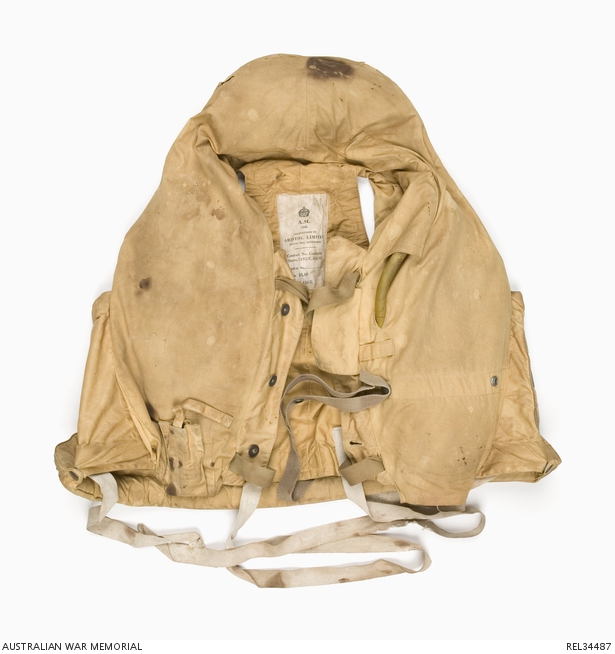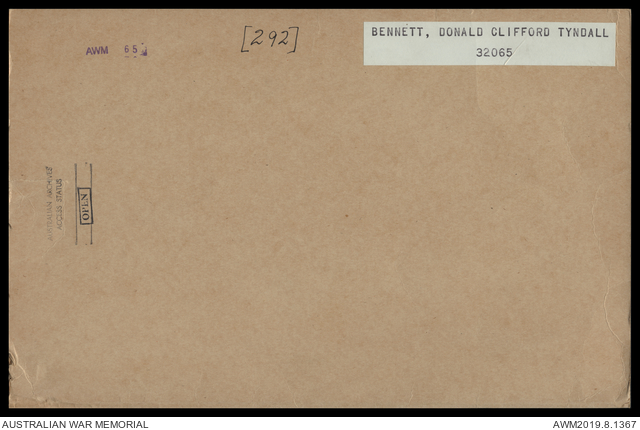| Service number | 32065 |
|---|---|
| Ranks Held | Acting Air Commodore, Acting Air Vice Marshal, Acting Wing Commander, Air Vice Marshal |
| Birth Date | 14/09/1910 |
| Birth Place | Australia: Queensland, Toowoomba |
| Death Date | 15/09/1986 |
| Final Rank | Air Vice Marshal |
| Service | Royal Air Force |
| Unit | No. 10 Squadron (RAF) |
| Place | Toowoomba |
| Conflict/Operation | Second World War, 1939-1945 |
Air Vice Marshal Donald Clifford Tyndall Bennett


Donald Bennett, senior RAF officer and commander of Bomber Command's Pathfinder Force, was born in Toowoomba, Queensland on 14 September 1910. The youngest of four boys, he began his schooling in Toowoomba before his family moved to Brisbane. A self-confessed lazy student, Bennett left school and became a jackeroo on his father's cattle property but returned to Brisbane after just three months. There he attempted to join the RAAF. He eventually succeeded, enlisting in Melbourne 12 months after being rejected on health grounds in Brisbane. Having enlisted in 1930, Bennett was transferred to 29 Squadron RAF the following year.
Bennett completed a flying boat course and was posted to 210 Squadron at Pembroke Dock, becoming a flying boat instructor in 1933. Two years later, Bennett - recognising the limited prospects for advancement in the peacetime air force - resigned. He married in the same year and returned to Australia. In January 1936, now back in England, Bennett joined a fledgling commercial seaplane airline, Imperial Airways.
During the opening months of the Second World War Bennett was involved in flying dignitaries in and out of England for Imperial. In 1940 he was sent to the United States to take charge of aircraft-ferrying operations between America and England, making several flights himself. In 1941 Bennett returned to the RAF as an acting wing commander in command of an air navigation school; in December that year he was given command of Bomber Command's 77 Squadron. Bennett was transferred to command 10 Squadron in April 1942. He flew many operations himself, and shortly after taking up his new appointment he was shot down over Norway in an attack on the Tirpitz. He managed to evade capture and reach Sweden and was awarded the Distinguished Service Order for this episode.
On 5 July 1942 Bennett, now an acting group captain, was given command of Bomber Command's new Pathfinder Force - whose job was to find and mark targets for main force crews. In January 1943 Bennett was again promoted, to air commodore, and placed in command of Bomber Command's 8 Pathfinder Force Group. Bennett took his responsibilities extremely seriously and explored every possible option for minimising aircrew losses and maximising the destructive power of the bomber force; he later admitted the enormous strain he experienced conducting such operations over a period of years.
Bennett was described as a man who did not suffer fools. Unfortunately he was sufficiently bright that many with lesser intellects earned his wrath and some found him difficult to work with. A keen advocate of an international police force that would prevent war, Bennett acted on his convictions by winning a seat in Parliament as a Liberal Party member. Ultimately he was disappointed at his inability to exert influence. He also became a critic of the United Nations, which he believed could do little to prevent future wars.
After the war Bennett also designed and built several light aircraft and cars. He died on 15 September 1986.







